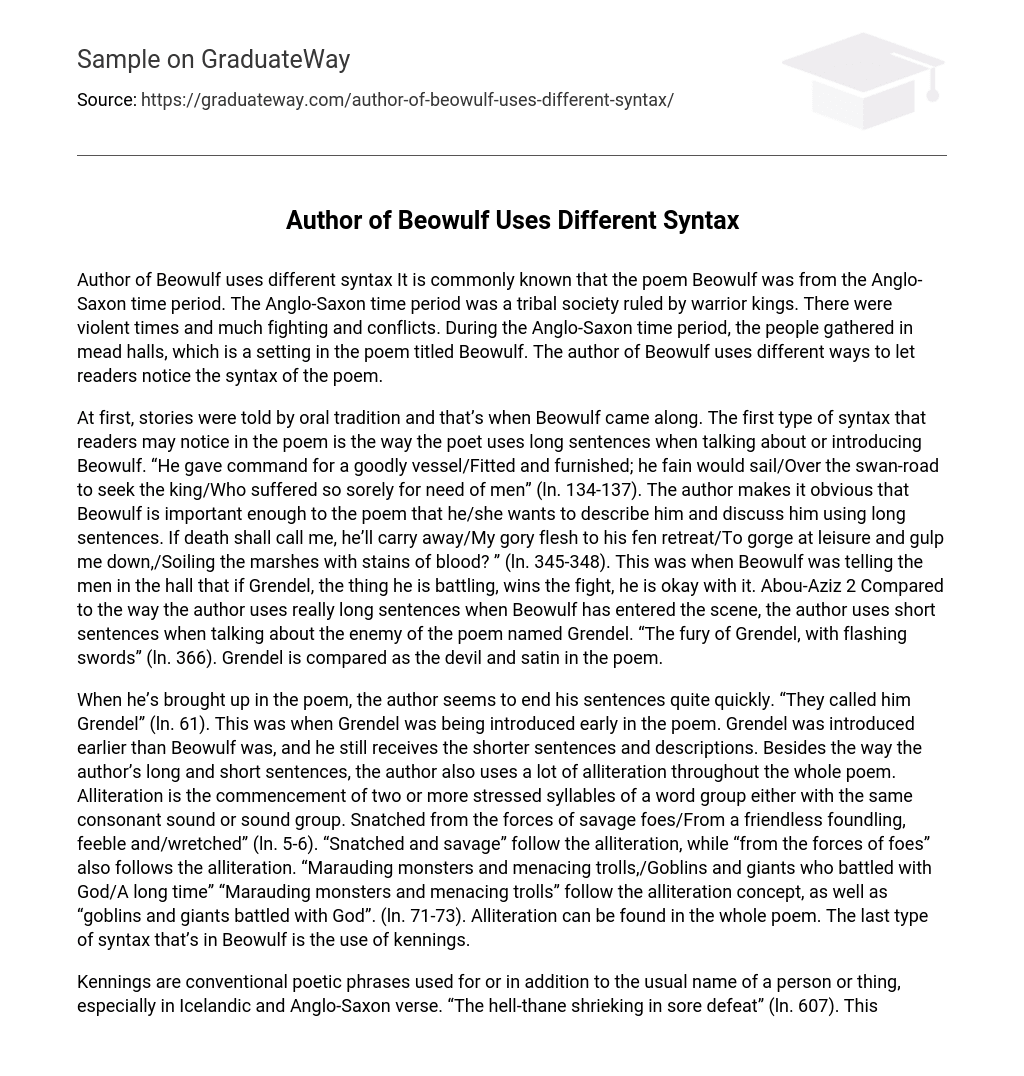Author of Beowulf uses different syntax It is commonly known that the poem Beowulf was from the Anglo-Saxon time period. The Anglo-Saxon time period was a tribal society ruled by warrior kings. There were violent times and much fighting and conflicts. During the Anglo-Saxon time period, the people gathered in mead halls, which is a setting in the poem titled Beowulf. The author of Beowulf uses different ways to let readers notice the syntax of the poem.
At first, stories were told by oral tradition and that’s when Beowulf came along. The first type of syntax that readers may notice in the poem is the way the poet uses long sentences when talking about or introducing Beowulf. “He gave command for a goodly vessel/Fitted and furnished; he fain would sail/Over the swan-road to seek the king/Who suffered so sorely for need of men” (ln. 134-137).
The author makes it obvious that Beowulf is important enough to the poem that he/she wants to describe him and discuss him using long sentences. If death shall call me, he’ll carry away/My gory flesh to his fen retreat/To gorge at leisure and gulp me down,/Soiling the marshes with stains of blood? ” (ln. 345-348). This was when Beowulf was telling the men in the hall that if Grendel, the thing he is battling, wins the fight, he is okay with it. Abou-Aziz 2 Compared to the way the author uses really long sentences when Beowulf has entered the scene, the author uses short sentences when talking about the enemy of the poem named Grendel. “The fury of Grendel, with flashing swords” (ln. 366). Grendel is compared as the devil and satin in the poem.
When he’s brought up in the poem, the author seems to end his sentences quite quickly. “They called him Grendel” (ln. 61). This was when Grendel was being introduced early in the poem. Grendel was introduced earlier than Beowulf was, and he still receives the shorter sentences and descriptions. Besides the way the author’s long and short sentences, the author also uses a lot of alliteration throughout the whole poem. Alliteration is the commencement of two or more stressed syllables of a word group either with the same consonant sound or sound group. Snatched from the forces of savage foes/From a friendless foundling, feeble and/wretched” (ln. 5-6). “Snatched and savage” follow the alliteration, while “from the forces of foes” also follows the alliteration. “Marauding monsters and menacing trolls,/Goblins and giants who battled with God/A long time” “Marauding monsters and menacing trolls” follow the alliteration concept, as well as “goblins and giants battled with God”. (ln. 71-73). Alliteration can be found in the whole poem. The last type of syntax that’s in Beowulf is the use of kennings.
Kennings are conventional poetic phrases used for or in addition to the usual name of a person or thing, especially in Icelandic and Anglo-Saxon verse. “The hell-thane shrieking in sore defeat” (ln. 607). This is a kenning for the demon by the name of Grendel. This was when Grendel had lost the battle with Beowulf and ran off like a coward. “And the peerless hero, the honored prince…” (ln. 89). This Abou-Aziz 3 is a kenning for King Hrothgar. Hrothgar is the king of the Danes when Beowulf arrives in their land, ready to fight the demon Grendel.
In the beginning of the poem, he is already an old king, but he is still a hero and an honored prince, as the kenning says. The poet of Beowulf uses different ways to allow readers to notice the different types of syntax in the poem. Beowulf is characterized as a fearless warrior with physical strength and a resourceful leader. These characteristics were very much admired by the Anglo-Saxon culture. He displays these virtues and characteristics throughout the epic tale of Beowulf. While the whole poem uses many ways to spice up the syntax, there are also other key elements that make Beowulf the poem it is today.





